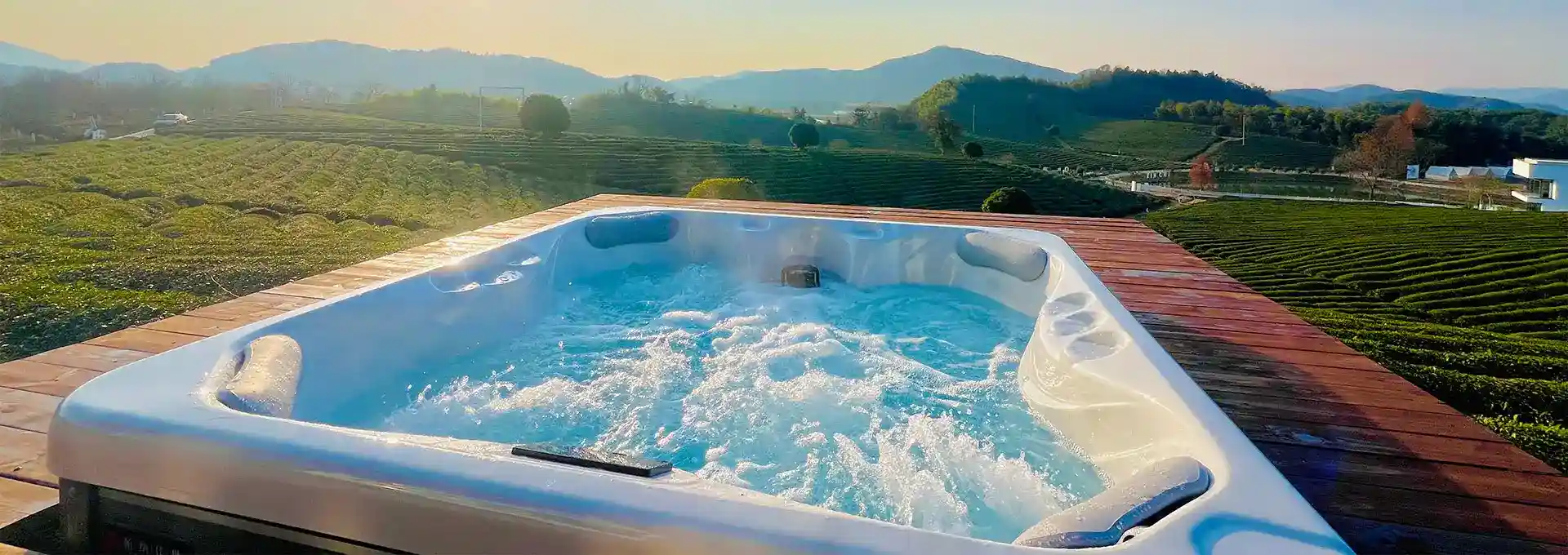How Much Does a Hot Tub Cost?
2024-07-18 10:58:32
Hot Tubs have become increasingly popular for those seeking a combination of aquatic exercise and relaxation. However, potential buyers often wonder about the cost of these versatile water features. The price of a Hot Tub can vary significantly depending on several factors, including size, features, and quality. In this article, we'll explore the costs associated with 5-man hot tubs and provide insights into what you can expect when considering this investment for your home.
What are the differences between a Hot Tub and a 5-man hot tub?
When comparing Hot Tubs and 5-man hot tubs, it's essential to understand their distinct features and purposes. While both offer aquatic relaxation, they cater to different needs and preferences.
Hot Tubs are designed to provide a space for both swimming and relaxation. They typically range from 12 to 21 feet in length and feature a continuous current that allows users to swim in place. This makes them ideal for those who want to combine exercise with leisure. Hot Tubs often have separate areas for swimming and lounging, with jets for hydrotherapy in the seating area.
On the other hand, a 5-man hot tub is primarily designed for relaxation and socializing. These hot tubs are usually smaller, ranging from 7 to 9 feet in diameter, and are equipped with multiple jets for hydrotherapy. They're perfect for unwinding after a long day or entertaining friends and family.
The main differences between Hot Tubs and 5-man hot tubs include:
1. Size: Hot Tubs are generally larger to accommodate swimming, while 5-man hot tubs are more compact.
2. Purpose: Hot Tubs offer both exercise and relaxation, whereas hot tubs focus primarily on relaxation and socializing.
3. Water temperature: Hot Tubs typically maintain a lower water temperature (around 80-85°F) for comfortable exercise, while hot tubs are kept warmer (around 100-104°F) for therapeutic purposes.
4. Features: Hot Tubs often include fitness accessories like rowing bars and resistance bands, which are not typically found in hot tubs.
5. Cost: Due to their larger size and additional features, Hot Tubs tend to be more expensive than 5-man hot tubs.
When deciding between a Hot Tub and a 5-man hot tub, consider your primary goals, available space, and budget. If you're looking for a versatile option that combines fitness and relaxation, a Hot Tub might be the better choice. However, if your focus is on relaxation and socializing in a more compact space, a 5-man hot tub could be the ideal option.
How much maintenance is required for a Hot Tub compared to a traditional pool?
Maintenance is a crucial factor to consider when investing in any water feature for your home. Hot Tubs generally require less maintenance than traditional pools, but they still need regular care to ensure optimal performance and longevity.
Hot Tub maintenance typically includes:
1. Water chemistry balance: Regular testing and adjustment of pH, alkalinity, and sanitizer levels are necessary to keep the water clean and safe. This is similar to pool maintenance but on a smaller scale.
2. Filtration system upkeep: Hot Tubs have built-in filtration systems that need periodic cleaning or replacement of filter cartridges.
3. Cleaning: Regular skimming of debris and occasional vacuuming of the spa floor are required to maintain cleanliness.
4. Cover care: The Hot Tub cover should be cleaned and treated periodically to prevent mildew and extend its lifespan.
5. Draining and refilling: 5-man hot tubs typically need to be drained, cleaned, and refilled every 3-4 months, depending on usage.
In comparison, traditional pools require:
1. More frequent water testing and chemical balancing due to larger water volume.
2. Regular skimming, brushing, and vacuuming of a larger surface area.
3. Maintenance of a more complex filtration and pump system.
4. Seasonal opening and closing procedures in regions with cold winters.
5. More extensive cleaning of walls and floor due to larger size.
6. Potential repairs to pool liner or concrete surfaces over time.
The main advantages of Hot Tub maintenance over traditional pool maintenance include:
1. Less water volume: Hot Tubs hold significantly less water than pools, making chemical balancing easier and reducing water and chemical costs.
2. Enclosed system: Most Hot Tubs are self-contained units, which minimizes debris accumulation and simplifies cleaning.
3. Year-round use: Many Hot Tubs can be used year-round, eliminating the need for seasonal opening and closing procedures.
4. Energy efficiency: Hot Tubs are generally more energy-efficient than pools due to their smaller size and better insulation.
5. Simpler equipment: Hot Tubs typically have less complex equipment than pools, which can mean fewer repairs and maintenance issues.
While Hot Tubs do require regular maintenance, the time and effort involved are generally less than what's needed for a traditional pool. This can make Hot Tubs an attractive option for those who want the benefits of aquatic exercise and relaxation without the extensive upkeep associated with a full-sized pool.
What are the energy costs associated with running a Hot Tub?
Understanding the energy costs of running a Hot Tub is crucial for potential buyers, as it impacts the long-term affordability of owning one. While the initial purchase price is a significant consideration, ongoing energy expenses can add up over time.
Several factors influence the energy consumption of a Hot Tub:
1. Size: Larger Hot Tubs require more energy to heat and maintain water temperature.
2. Usage frequency: More frequent use means more energy consumption for heating and running pumps.
3. Climate: Colder climates necessitate more energy for heating, especially if the Hot Tub is used year-round.
4. Insulation quality: Well-insulated 5-man hot tubs retain heat better, reducing energy costs.
5. Cover efficiency: A high-quality, well-fitting cover helps minimize heat loss when the spa is not in use.
6. Pump efficiency: Energy-efficient pumps can significantly reduce electricity consumption.
7. Heating system: The type and efficiency of the heating system impact energy usage.
8. Temperature settings: Higher temperature settings require more energy to maintain.
On average, the energy costs for running a Hot Tub can range from $50 to $250 per month, depending on the factors mentioned above. However, this can vary widely based on local energy rates and specific usage patterns.
To minimize energy costs:
1. Invest in a well-insulated Hot Tub with an efficient heating system.
2. Use a high-quality, insulated cover and ensure it's properly sealed when the spa is not in use.
3. Lower the water temperature when the Hot Tub is not in use, especially for extended periods.
4. Use energy-efficient LED lighting instead of traditional incandescent lights.
5. Regular maintenance of filters and pumps to ensure they're operating at peak efficiency.
6. Consider using a timer to run filtration cycles during off-peak electricity hours.
7. In colder climates, consider partially burying the Hot Tub or creating a windbreak to reduce heat loss.
8. Explore renewable energy options like solar panels to offset electricity costs.
While energy costs are a consideration, many Hot Tub owners find that the benefits of year-round access to aquatic exercise and relaxation outweigh the additional utility expenses. Moreover, when compared to heating and maintaining a traditional pool, Hot Tubs can be more energy-efficient due to their smaller size and better insulation.
It's important to research and compare different Hot Tub models, focusing on their energy efficiency ratings and insulation quality. Some manufacturers provide estimated monthly operating costs based on average usage, which can be helpful in budgeting for long-term ownership.
In conclusion, while the initial cost of a 5-man hot tub can be substantial, ranging from $15,000 to $50,000 or more depending on size and features, it's essential to consider the long-term costs as well. This includes not only energy expenses but also maintenance, water treatment, and potential repairs. By carefully evaluating these factors and choosing an energy-efficient model, you can enjoy the benefits of a Hot Tub while managing ongoing costs effectively.
If you want to get more information about this product, you can contact us at info@iparnassus.com!
References:
1. Swim University. (2021). Hot Tub Costs: A Complete Buyer's Guide.
2. Pool Research. (2022). Average Hot Tub Prices, Costs, and Factors.
3. River Pools and Spas. (2023). Hot Tub Cost: How Much Is a Hot Tub?
4. Aqua Magazine. (2022). Energy Efficiency in Hot Tubs.
5. Hot Spring Spas. (2023). Hot Tub vs. Hot Tub: Which One Is Right for You?
6. Hot Tub Guide. (2022). Hot Tub Maintenance: A Comprehensive Guide.
7. Energy.gov. (2023). Energy-Efficient Pool and Spa Systems.
8. Endless Pools. (2023). Hot Tub Energy Efficiency: What You Need to Know.
9. Master Spas. (2022). The Real Cost of Owning a Hot Tub.
10. Home Advisor. (2023). How Much Does a Hot Tub Cost to Install?



